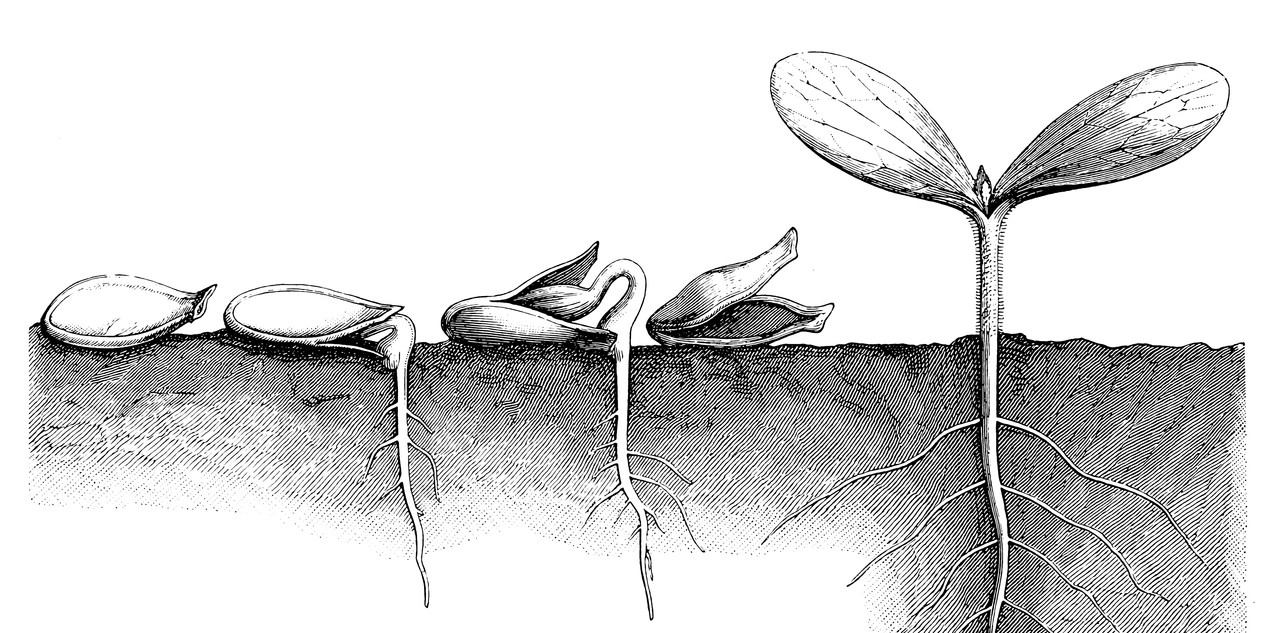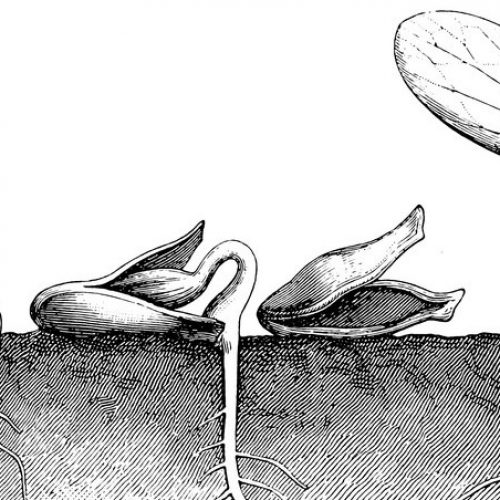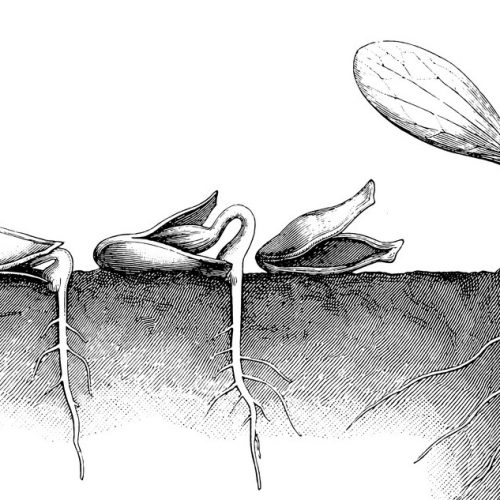sid sibo recently sat down with our Associate Managing Editor, R.S. Saha, to talk about animals, the connectedness of characters and environment, and how a shift to a more environmental worldview impacts their work. sid’s debut novel The Scent of a Distant Family, published by the University of Nebraska Press.
R.S. Saha: The radicle is the first part of a plant embryo to emerge and root. What would you say is the radicle of your work as an author?
sibo: As an often wayward child who loved to wander in the woods behind our house, my parents knew grounding me to my bedroom was painful punishment. What became only slowly apparent, however, was how fast I escaped into the storybooks there. Later, I learned to scramble out the bathroom window with a favorite book, climb into a tree, and read in the dappling light. Climbing back in was not an option, but by then, I knew a spy’s stealth, or how a cat might move without being seen.
R.S. Saha: Your love of animals is apparent in The Scent of Distant Family, particularly through your use of anthropomorphism, characterization, and the book’s themes. Additionally, you co-founded an animal shelter, and on your website, you state that all proceeds from this novel will be donated to animal welfare. Can you share a bit about your love for animals and how it permeates your writing as well as other aspects of your life?
sibo: Reading so many books—even great books—that have not a single sparrow flying through the pages brought me this sense of how literature contributes to a false separation of humans from the rest of the living planet. Creative nonfiction and poetry are leaps ahead of novels, and I’m excited to embrace Amitav Ghosh’s challenge to bring fiction into this urgent worldview shift. We live with over 30 rescued animals here on a little farm (and in a little cabin), so animal agency is constantly apparent. Within the Greater Yellowstone Ecosystem, intact relationships across diverse species also highlight entangled lives beyond ours.
Notably, as far back as 5th grade, in the early days of the Endangered Species Act, I started a group of penpal wildlife advocates, and my first focus species was the wolf—which eventually led to my volunteer efforts on wolf research in northern Minnesota and then helping The Wolf Fund in Wyoming work to reintroduce wolves to this ecosystem.
R.S. Saha: Anthropomorphism can be a risky approach in adult fiction, but one that pays off exceptionally well in The Scent of Distant Family. Why do you think it works in this novel? What made you confident it would be well received?
sibo: In my imagination, these animals are being themselves—not “humanlike,” as the term “anthropomorphic” implies. For a first novel, taking risks comes with zero confidence regarding reception. Still, I found so much fresh awareness from nonfiction writers like Sy Montgomery and Carl Safina and, lately, Richard MacFarlane and Merlin Sheldrake, who argue for legal rights of beinghood rather than personhood. If my efforts “work” for readers, it might be that, as a society, we are more open to this awareness again. Indigenous activists and writers have pushed us in this direction for a while, but publishers of adult fiction have been slow to recognize people’s long hunger for wholeness and belonging in our larger world.
R.S. Saha: The only characters in the novel that seem to have isolation figured out are the (non-human) animals. And while they are careful, they still exhibit a willingness to trust the “other.” It’s an openness the human characters seem to struggle with. Does this reflect what you’ve observed in your work with animals?
sibo: In a sense, yes. It may be as individual for other animals as it can be in humans, but for many of us, curiosity seems key to openness, and some animals work with their curiosity turned on high, not nearly as wired to instinct (or social programming) as we’ve been taught. Flexibility in how to approach the given challenges in any life, human or beyond-human, seems to hold the strongest potential for resilience, a quality we’re all looking to strengthen as change continues to speed up.
R.S. Saha: Characters can often reflect aspects of the writer. Which character do you feel the closest resemblance to? Is there a character you wish you were more like?
sibo: As for resemblance, one friend called the story’s characters “prickly,” and whenever any of them show their prickly side, that aspect might well come directly from parts of myself. Tess, on the other hand, is a leader who plays with the young’un and protects the protector, admirable traits I try to emulate.
R.S. Saha: How do you go about writing well-rounded, believable characters that the reader can empathize with, even if they disagree with their actions? What approaches or craft elements feel most important to characterization for you?
sibo: Complicate your characters—always. What stereotypes might they fit within, and how do they also contradict expectations? How self-aware are they, and which ones need other characters to show us (and maybe them) aspects of their character that are harder to spot? Why are their wounds so critical to their thinking and sometimes inexplicable behaviors? As for craft elements: use everything you know, and in your reading of other writers, interrogate their craft whenever you find yourself surprised by a particular character’s relatability. My favorite approach might be to show readers what different characters pay attention to as a path into their psyches—maybe that comes from their job, or from their wounds or paranoias. Writers can never show everything in a story’s reality, so what details you utilize must come from the characters themselves. In this story, scent plays a larger-than-typical role because of the dog and the band of wild horses.
R.S. Saha: Fiction writers often walk a careful line between sharing a belief/worldview and preaching it. The former encourages conversation and reflection, while the latter can easily turn a story into an admonishment or a prescription. How do you walk that line while writing about wildlife, corporate greenwashing, and the environment as a whole? Do your test-readers have a metaphorical rolled-up newspaper to whack your writing hand with?
sibo: (Ha! Hopefully you didn’t want to roll up some newspaper; none of my test readers pointed out any lecturing!) This is why I love to write from multiple POVs—to show disagreement and contention and let the characters try to explain themselves, rather than creating some narrative overlord. In the case of the other-than-human characters in this story, their behavior expresses, without preaching, their agency and problem-solving capacities. Often, the quandaries characters face will have multiple possible outcomes, some positive and some negative, so the task becomes weighing what matters—hard choices are always more interesting.
R.S. Saha: Finally, do you have any advice for writers and other creatives still searching for their “radicle”?
sibo: Read. Read widely, without prejudice regarding genre. Read beyond your own geography/ies and identity/ies. For all creatives: Get outside your own training, preferably into worlds beyond human, be it to follow a crooked line of ants down a cracked sidewalk or a polar bear over ocean ice or even a cloud pushing its shadow across a rippled prairie—and let those worlds disorient you. We must decolonize our minds from the failing dominant worldview and open our curiosity in whatever direction seems most intriguing in the moment.
Read more of sid sibo’s published work at The Fourth River







